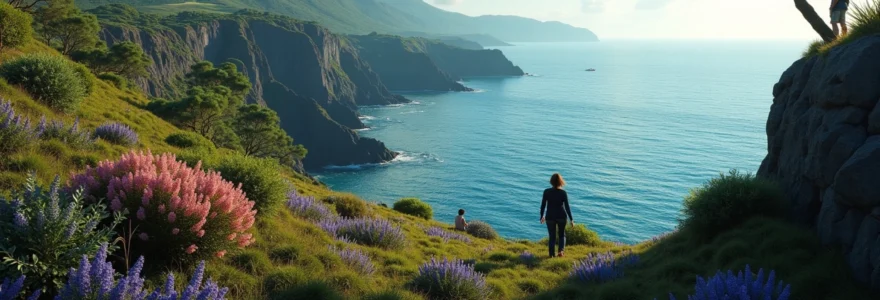Nestled in the heart of the Atlantic Ocean, the Azores archipelago stands as a beacon of unspoiled natural beauty and sustainable tourism. This Portuguese autonomous region, comprising nine volcanic islands, offers a unique blend of dramatic landscapes, rich biodiversity, and a commitment to eco-friendly practices. For those seeking an immersive experience in pristine environments, the Azores present an unparalleled opportunity to reconnect with nature while treading lightly on the Earth.
Unique azorean ecosystems: from volcanic landscapes to marine biodiversity
The Azores’ geological origins have sculpted a landscape of extraordinary diversity, creating habitats that support a wide array of flora and fauna. From lush forests to azure lakes nestled in ancient calderas, the archipelago’s ecosystems are as varied as they are stunning. This natural tapestry serves as a living laboratory for scientists and a paradise for eco-conscious travellers alike.
Geological marvels of são miguel island: sete cidades and furnas calderas
São Miguel, the largest island in the Azores, is home to some of the archipelago’s most iconic geological features. The twin lakes of Sete Cidades, nestled within a massive caldera, offer a breathtaking panorama of blue and green waters separated by a narrow strip of land. Legend has it that these lakes were formed from the tears of star-crossed lovers, adding a touch of romance to the already enchanting landscape.
Further east, the Furnas caldera presents a different face of volcanic activity. Here, visitors can witness the Earth’s raw power through bubbling hot springs, steaming fumaroles, and mineral-rich mudpots . The geothermal activity in Furnas not only shapes the landscape but also plays a crucial role in local culture and cuisine, as evidenced by the traditional cozido das Furnas , a meal cooked using underground heat.
Endemic flora in faial’s botanical garden: azorean juniper and picconia azorica
Faial Island’s botanical garden serves as a living archive of the Azores’ unique plant life. Here, nature enthusiasts can observe rare endemic species that have evolved in isolation over millennia. The Azorean Juniper ( Juniperus brevifolia ) stands as a testament to the islands’ unique evolutionary path, its gnarled branches adapted to withstand the Atlantic winds.
Another botanical treasure is the Picconia azorica, an evergreen tree found nowhere else on Earth. These endemic species underscore the importance of conservation efforts in the Azores, as they represent irreplaceable components of global biodiversity. The botanical garden not only showcases these rare plants but also educates visitors on the delicate balance of island ecosystems.
Marine sanctuaries: cory’s shearwaters and sperm whale populations off pico
The waters surrounding the Azores teem with marine life, making the archipelago a crucial sanctuary for numerous species. Off the coast of Pico Island, lucky observers may witness the graceful flight of Cory’s Shearwaters, seabirds that return to the Azores each year to breed. These birds, with their distinctive calls, have become emblematic of the islands’ rich avian diversity.
Beneath the waves, the Azores serve as a vital habitat for sperm whales. These magnificent creatures find refuge in the deep waters around the islands, attracting researchers and eco-tourists alike. Responsible whale watching expeditions offer a chance to observe these gentle giants in their natural environment, fostering appreciation and support for marine conservation efforts.
Sustainable tourism initiatives in the azores archipelago
The Azores have embraced sustainable tourism as a cornerstone of their development strategy, recognizing the delicate balance between ecological preservation and economic growth. This commitment is evident in the innovative approaches to waste management, energy production, and conservation across the islands.
Maia’s integrated waste management system on santa maria
On Santa Maria Island, the municipality of Maia has implemented a cutting-edge integrated waste management system that serves as a model for sustainable practices in island communities. This system emphasizes recycling, composting, and waste reduction, significantly decreasing the amount of refuse sent to landfills.
Visitors to Maia can observe firsthand how a small community can make a big impact on environmental conservation. The system includes educational programs for both residents and tourists, fostering a culture of responsibility and environmental stewardship that extends beyond the shores of Santa Maria.
Graciosa’s UNESCO biosphere reserve: balancing conservation and development
Graciosa Island, designated as a UNESCO Biosphere Reserve, exemplifies the harmonious coexistence of human activity and nature conservation. This recognition highlights the island’s success in maintaining its unique ecosystems while supporting sustainable economic activities.
The biosphere reserve status has encouraged the development of eco-friendly agricultural practices, sustainable fishing methods, and low-impact tourism initiatives. Visitors to Graciosa can explore traditional windmills repurposed for environmental education, participate in guided nature walks, and stay in accommodations that adhere to strict sustainability criteria.
Terceira’s geothermal energy utilization: reducing carbon footprint in tourism
Terceira Island has taken significant strides in harnessing its geothermal resources to power tourism infrastructure, dramatically reducing the sector’s carbon footprint. The island’s geothermal power plant not only provides clean energy to local communities but also supplies heat and electricity to eco-lodges and tourist facilities.
This innovative approach to energy production allows visitors to enjoy modern comforts with minimal environmental impact. Hotels and resorts on Terceira proudly showcase their geothermal heating systems and educate guests on the importance of renewable energy in preserving the Azores’ natural beauty.
Eco-adventure activities: immersive natural experiences
The Azores offer a plethora of eco-adventure activities that allow visitors to engage with the natural environment in meaningful and responsible ways. From hiking through lush forests to exploring underground lava tubes, these experiences provide intimate encounters with the islands’ unique ecosystems.
Hiking the hydrangea-lined trails of flores island
Flores Island, often referred to as the “Ilha das Flores” (Island of Flowers), is renowned for its stunning hiking trails bordered by vibrant hydrangeas. These paths wind through diverse landscapes, from cascading waterfalls to dramatic coastal cliffs, offering hikers breathtaking views at every turn.
One of the most popular trails leads to the Rocha dos Bordões, a remarkable geological formation of vertical basalt columns. As you trek through this floral paradise, you’ll encounter numerous endemic plant species and perhaps catch glimpses of the Azores bullfinch, a bird found nowhere else on Earth.
Kayaking through lava tubes in terceira’s algar do carvão
For a truly unique eco-adventure, visitors to Terceira can explore the otherworldly environment of Algar do Carvão, an ancient lava tube that descends deep into the island’s volcanic heart. Guided kayak tours through the water-filled sections of this geological wonder offer an unforgettable journey through time and Earth’s fiery past.
As you paddle through the dimly lit chambers, expert guides share insights into the formation of these volcanic structures and their ecological significance. The experience not only thrills adventure seekers but also educates participants on the geological processes that shaped the Azores.
Birdwatching at corvo’s caldeirão: spotting nearctic vagrants
Corvo, the smallest and most remote island of the Azores, has gained international acclaim among birdwatchers for its unique position as a resting point for Nearctic vagrant birds. The island’s caldera, known as Caldeirão, serves as a natural sanctuary for these avian visitors, making it a prime location for observing rare species.
During the autumn migration period, enthusiasts flock to Corvo for the chance to spot American warblers, vireos, and other transatlantic wanderers. This eco-tourism niche not only provides unforgettable experiences for birdwatchers but also contributes to ongoing research and conservation efforts focused on migratory patterns and climate change impacts.
Azorean culinary traditions: Farm-to-Table and sustainable fishing practices
The culinary landscape of the Azores is deeply rooted in sustainable practices, showcasing the archipelago’s commitment to preserving traditional methods while embracing eco-friendly innovations. From geothermal cooking to artisanal cheese production, Azorean cuisine offers a taste of the islands’ natural bounty and cultural heritage.
Cozido das furnas: geothermal cooking in são miguel’s volcanic soil
In the geothermally active valley of Furnas on São Miguel Island, visitors can experience a unique culinary tradition that harnesses the Earth’s natural heat. Cozido das Furnas is a hearty stew slow-cooked in underground ovens heated by volcanic steam. This method not only imparts a distinctive flavor to the dish but also represents a sustainable cooking practice that has been used for generations.
Watching local chefs lower pots into the steaming ground and retrieve them hours later is a captivating spectacle that connects diners to the island’s volcanic heritage. The resulting meal, rich with local meats and vegetables, embodies the essence of Azorean farm-to-table cuisine.
Artisanal cheese production on são jorge: PDO queijo são jorge
São Jorge Island is renowned for its artisanal cheese production, particularly the PDO (Protected Designation of Origin) Queijo São Jorge. This semi-hard cheese, made from raw cow’s milk, reflects the island’s lush pastures and traditional dairy farming practices that have been sustained for centuries.
Visitors can tour small-scale cheese factories to witness the meticulous process of cheese-making, from milk collection to aging. The production of Queijo São Jorge not only preserves a vital piece of Azorean cultural heritage but also supports sustainable agricultural practices that maintain the island’s picturesque pastoral landscapes.
Sustainable fishing methods: hand-line caught tuna in horta, faial
The port of Horta on Faial Island is at the forefront of sustainable fishing practices in the Azores. Here, traditional hand-line methods are used to catch tuna, ensuring minimal bycatch and reduced impact on marine ecosystems. This artisanal approach not only produces high-quality fish but also supports local fishing communities and preserves maritime traditions.
Restaurants in Horta proudly serve hand-line caught tuna, often prepared with simple, local ingredients that allow the fish’s superior flavor to shine. By choosing these sustainably sourced seafood options, visitors contribute to the preservation of both culinary heritage and marine biodiversity in the Azores.
Climate-responsive architecture and Eco-Lodges in the azores
The Azores have embraced innovative architectural approaches that blend seamlessly with the natural environment while minimizing ecological impact. From bioclimatic designs to the use of local materials, eco-lodges across the archipelago offer travelers comfortable accommodations that reflect a deep commitment to sustainability.
Santa barbara Eco-Beach resort: bioclimatic design in são miguel
The Santa Barbara Eco-Beach Resort on São Miguel Island stands as a prime example of bioclimatic architecture in the Azores. This cutting-edge resort utilizes passive solar design, natural ventilation systems, and locally sourced materials to create a comfortable environment for guests while minimizing energy consumption.
Large windows and strategic orientation maximize natural light and heat gain during cooler months, while deep overhangs and cross-ventilation keep interiors cool in summer. The resort’s integration with the surrounding landscape not only reduces its visual impact but also creates a seamless connection between indoor and outdoor spaces, allowing guests to fully immerse themselves in the island’s natural beauty.
Aldeia da fonte on pico: integrating local basalt in sustainable construction
On Pico Island, the Aldeia da Fonte hotel complex showcases the innovative use of local basalt in sustainable construction. This volcanic stone, abundant throughout the Azores, is employed in both structural and decorative elements, reducing the need for imported materials and celebrating the island’s geological heritage.
The use of basalt not only provides excellent thermal mass, helping to regulate indoor temperatures naturally, but also creates a striking visual aesthetic that harmonizes with the surrounding volcanic landscape. Guests at Aldeia da Fonte can experience firsthand how traditional building materials can be reimagined for modern, eco-friendly accommodations.
Quinta da meia eira: permaculture principles in rural tourism on flores
Quinta da Meia Eira on Flores Island represents a holistic approach to sustainable rural tourism, incorporating permaculture principles into every aspect of its operation. This small eco-lodge not only provides comfortable accommodations but also serves as an educational center for sustainable living practices.
Visitors can explore organic gardens designed using permaculture techniques, learn about rainwater harvesting systems, and observe how waste is minimized through composting and recycling. The quinta’s commitment to self-sufficiency and ecological harmony offers guests a unique opportunity to experience a truly sustainable lifestyle in the heart of the Azores’ natural splendor.


